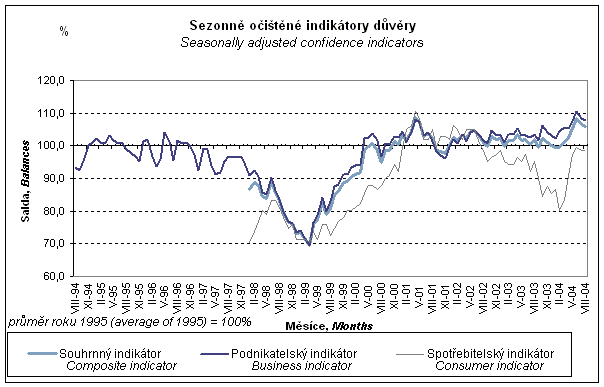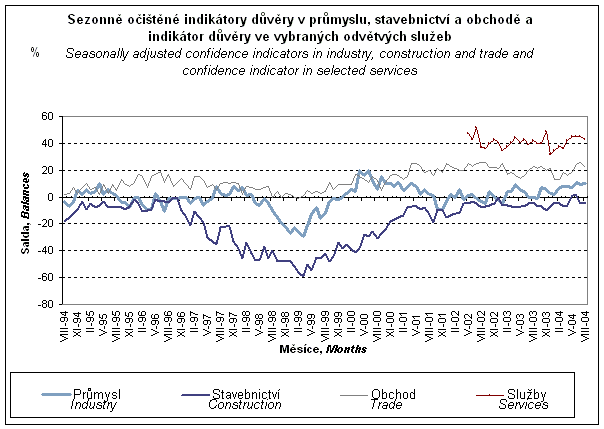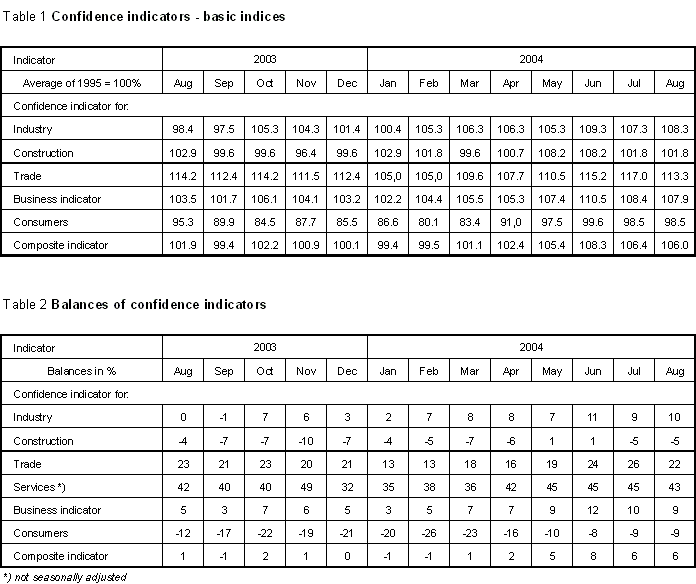Business cycle survey - August 2004
Confidence of entrepreneurs and consumers is still high
Publication Date: 26. 08. 2004
Product Code: r-1201-04
In August 2004 , the composite confidence indicator balance and the consumer confidence indicator balance remained unchanged month-on-month; the business confidence indicator balance dropped slightly, due to a decrease in the confidence indicator in trade. The confidence indicators reach favourable values in the long term.

In the industry (943 respondents), 43% of the respondents considered their economic situation good, 54% satisfactory and 3% bad, which was a better result than in July. After seasonal adjustment, the assessment of current total demand (order books) for the enterprise output increased, compared to assessment in July (balance 3 points up). Also the assessment of current foreign demand (order books) for the enterprise output increased against July (balance 7 points up). Stocks of finished goods decreased, the respondents say.
After preceding high increases, the respondents expect a slowdown of production activity in next three months (balance 4 points down) and hardly any changes in the development of employment. In next six months , the respondents expect their economic situation will have a downward trend too. All the data are seasonally adjusted.
On the whole, the confidence indicator in industry increased by 1 point m-o-m. In terms of y-o-y comparison, this indicator is by 10 points higher than in August 2003 and remains at a high level in the long term.
In construction enterprises (442 respondents), the assessment of the current economic situation further improved (after seasonal adjustment), compared to July (balance 1 point up). The assessment of total demand (order books) for the enterprise output worsened (balance 1 point down). In next three months , the respondents expect a slowdown of construction activity, under constant employment. The overall confidence indicator in construction did not change m-o-m; in terms of y-o-y comparison, it is 1 point down on August 2003.
Among respondents engaged in trade (317), 50% considered the economic situation of their enterprises good, 47% as corresponding to the season and 3% bad, which was a 9-point increase of the balance on July (seasonally adjusted). The respondents signal pre-stock of goods in their companies. In total, 81% of the respondents expect a price development without changes, 8% and 11% expect growing and falling prices, respectively. In next six months , 34% of the respondents predict improvement in the economic situation (55% in July), 66% anticipate no changes (44% in July) and 0% expect worsening (1% in July). The overall confidence indicator in trade decreased by 4 points m-o-m and 1 point on August 2003.
In selected services (738 respondents), 55% of the respondents assessed their current economic situation in August as good, 44% as corresponding to the season and 1% as bad, which was a worse assessment than in July. In total, 39% of the respondents expect a rise in demand (order books), 58% anticipate no changes, and 3% a drop, these expectations are better than in July. According to 90% of the respondents, no changes in price development should occur, 9% envisage a rise in prices and 1% a drop. Decreasing numbers of employees are expected by 40% of the respondents, no changes are anticipated by 49% and an increase is envisaged by 11% of the respondents. The overall confidence indicator in selected services decreased, but is 1 point up on August 2003.

A survey taken among consumers (1000 respondents) in August suggests a decrease in the balance of indicator expected overall economic situation and in their financial situation in next twelve months . The balance of expected total economic situation fell by 3 points and the balance of expected consumers´ financial situation decreased by 4 points. Compared to July, the share of consumers expecting higher unemployment went down, and the balance decreased by 2 points. The share of respondents with the intention of saving money grew (balance 3 points up), and the plans of consumers to buy consumer durables were lower (balance 6 points down). Compared to preceding month, the overall consumer confidence indicator did not change and is 3 points up on August 2003.

Note
Contact: Marie Hörmannová, phone (+420) 274052049,
e-mail hormannova@gw.czso.cz
Data source: CZSO business surveys, GfK Praha consumer survey
End of data collection: 20 August 2004
End of data processing: 24 August 2004
For more information: https://csu.gov.cz
Methodological explanatory notes :
The composite confidence indicator is a weighted average of seasonally adjusted confidence indicators in industry, construction, trade, and of the consumer confidence indicator. The composite business confidence indicator is a weighted average of seasonally adjusted confidence indicators in industry, construction and trade. The confidence indicator in industry has a double weight. Since January 2002, the consumer confidence indicator has been composed of four indicators (expected financial situation of consumers, expected total economic situation, expected total unemployment (with inverted sign) and savings expected in 12 months to come). Since January 2003, the confidence indicators have been presented as basic indices; the base being the average of 1995.
The branch confidence indicators are constructed as averages of seasonally adjusted weighted business cycle balances. The business cycle balance is the percentage difference between the responses “growth (+)” and “fall (-)”. The confidence indicator for industry is the average of seasonally adjusted balances of three indicators (the assessment of total demand, stocks of final production (with inverted sign) and the expected development of production activity). The confidence indicator for construction is the average of two indicators (the assessment of total demand and the expected development of employment). The confidence indicator for trade is the average of three indicators (the assessment of economic situation, stocks (with inverted sign) and the expected development of economic situation). The business cycle survey in selected services has been conducted by the Czech Statistical Office since May 2002. This is why the time series are not seasonally adjusted. Data for hotels and restaurants are included in the data for selected services. The time series are converted and the data are comparable. The confidence indicator for selected services is the average of three indicators (the assessment of economic situation, the assessment of demand and expected demand). The confidence indicator for selected services is not being included into composite indicators, yet.
The data above were derived in a weighted manner: sales were used as weights for industry, services and trade, whereas construction work of contractors and subcontractors was the weight for construction. The responding groups of enterprises account for more than a half of sales (industry) and volume (construction) and for a quarter of sales in trade.
